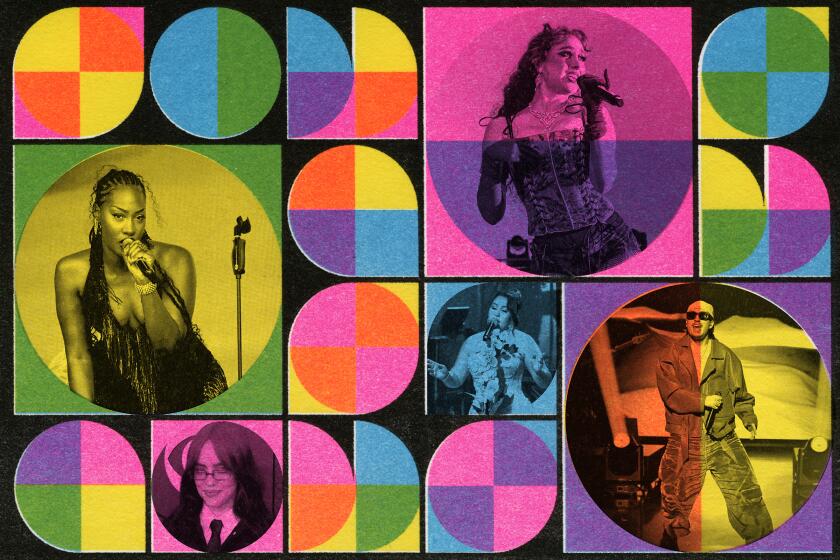POP MUSIC REVIEW : Sinead O’Connor Has Got It : Concert: The young Irishwoman not only entertains and inspires, but also lifts our expectations of what music can be.
SAN DIEGO — Call her 1990’s Tracy Chapman . . . this decade’s Chrissie Hynde . . . or even a new generation’s Patti Smith.
Too much praise for a 23-year-old Irish singer-songwriter with just two albums to her credit?
Not if you’ve heard Sinead O’Connor’s seductively tender version of Prince’s “Nothing Compares 2 U” or her hauntingly personal “I Do Not Want What I Haven’t Got” album--or if you saw her concert on Tuesday at San Diego State University’s Open Air Theatre.
In the unending parade of pop faces and styles, O’Connor offers traces on record and on stage of being a trailblazer--someone like Chapman, Hynde and Smith who not only entertains and inspires, but also lifts our expectations of pop music.
O’Connor’s songs of personal exorcism and spiritual transformation are so intimate and unguarded that you feel at times you’re eavesdropping in a confessional--or overhearing a stormy scene in a bedroom, or in one song witnessing the final, bitter goodbys of a couple in an attorney’s office.
O’Connor--who continues her U.S. tour with sold-out shows tonight and Friday at the Wiltern Theatre in Los Angeles--writes about betrayal and misjudgments with anger and fury, but she emerges from it all with a sense of optimism and faith.
“God grant me the serenity to accept the things I cannot change, the courage to change the things I can, and the wisdom to know the difference,” she whispered into the microphone at the start of Tuesday’s concert, duplicating the familiar “Serenity Prayer” that opens her album.
With just a trace of a spotlight on her, O’Connor stared into the darkness of the audience after delivering that prayer and sang “Feel So Different,” a song about the changes in her own life.
Sample lines:
The whole time I’d never seen
All you had spread before me
The whole time I’d never seen
That all I’d need was inside me.
Who would have imagined in the Me Decade of the ‘80s that the “first pop superstar of the ‘90s”--as Rolling Stone magazine describes O’Connor--would be someone proclaiming that you don’t need what you haven’t got.
Coupled with the introspective, philosophical nature of her music, this head-spinning success could tempt O’Connor into presenting herself as some sort of precious angel--an image she called to mind (no doubt inadvertently) when she walked on stage at one stop on her recent European tour in a hooded robe.
By looking like a member of some exotic monastic order, O’Connor focused attention during that concert on the spiritual undercurrents in the album.
On Tuesday, however, O’Connor wore a leather jacket, jeans and cowboy boots, emphasizing the frisky, down-to-earth side of her personality and music.
When O’Connor, an outspoken fan of rap music, took off the jacket, the lettering on her T-shirt spotlighted the playfulness even more. In a tip of the hat to the controversial Los Angeles rap group N.W.A, the front of the shirt read “P.W.A.”--for, as the lettering on the back explained, “Paddies With Attitude.”
As the concert (which was opened by low-key English soul singer Hugh Harris) proceeded, O’Connor moved from the cathedral-like tone of the opening number through the rock ‘n’ roll sass of “The Emperor’s New Clothes,” a tale of confrontation, to the sensual heat of “I Want Your (Hands On Me).”
The thin, doleful-eyed Irishwoman underscored the latter expression of desire by caressing her body with as much eyebrow-raising abandon as anything Madonna exhibited in the bedroom fantasies in her “Blond Ambition” show. Where the Madonna caresses seemed choreographed, O’Connor’s were more startling--and sexy--because they appeared to be spontaneous: a lightning flash of naked emotion.
It’s precisely that quality that makes O’Connor so compelling. Like her shaved head, there is something strikingly unadorned about everything she does on stage--from the naturalness of her mostly understated manner to the way she uses her four-piece band. Instead of finding a place for them in every song, O’Connor was sometimes alone on stage, and sometimes was joined by just one other musician.
Her greatest talent at this early point in her career is her singing, which moves between a whisper and a scream with the suddenness and authority of a stunt-car driver swerving to avoid an accident.
But her most prized attribute may be her ability to infuse music with the most profoundly personal feelings, yet leave enough room for the audience to find its own emotional connection.
She also demonstrates, in “Black Boys on Mopeds,” an ability to move beyond her introspective feelings to reflect on social injustice. Sample lines:
England’s not the mythical land of Madame George and roses
It’s the home of police who kill black boys on mopeds.
And I love my boy and that’s why I’m leaving
I don’t want him to be aware that there’s
Any such thing as grieving.
It’s a mother speaking intuitively in the line about leaving England, not a literal declaration. O’Connor, who is married and has a young son, hasn’t left London in protest because she knows there is injustice everywhere.
But she left in the line in the song because it reflected her immediate impulse, and it’s that uncensored freedom of poetic expression that connects O’Connor with the great artists in pop. This young talent has a long way to go to prove she is an artist for the ages, but her beginning is as inspiring as any in years.
More to Read
The biggest entertainment stories
Get our big stories about Hollywood, film, television, music, arts, culture and more right in your inbox as soon as they publish.
You may occasionally receive promotional content from the Los Angeles Times.










